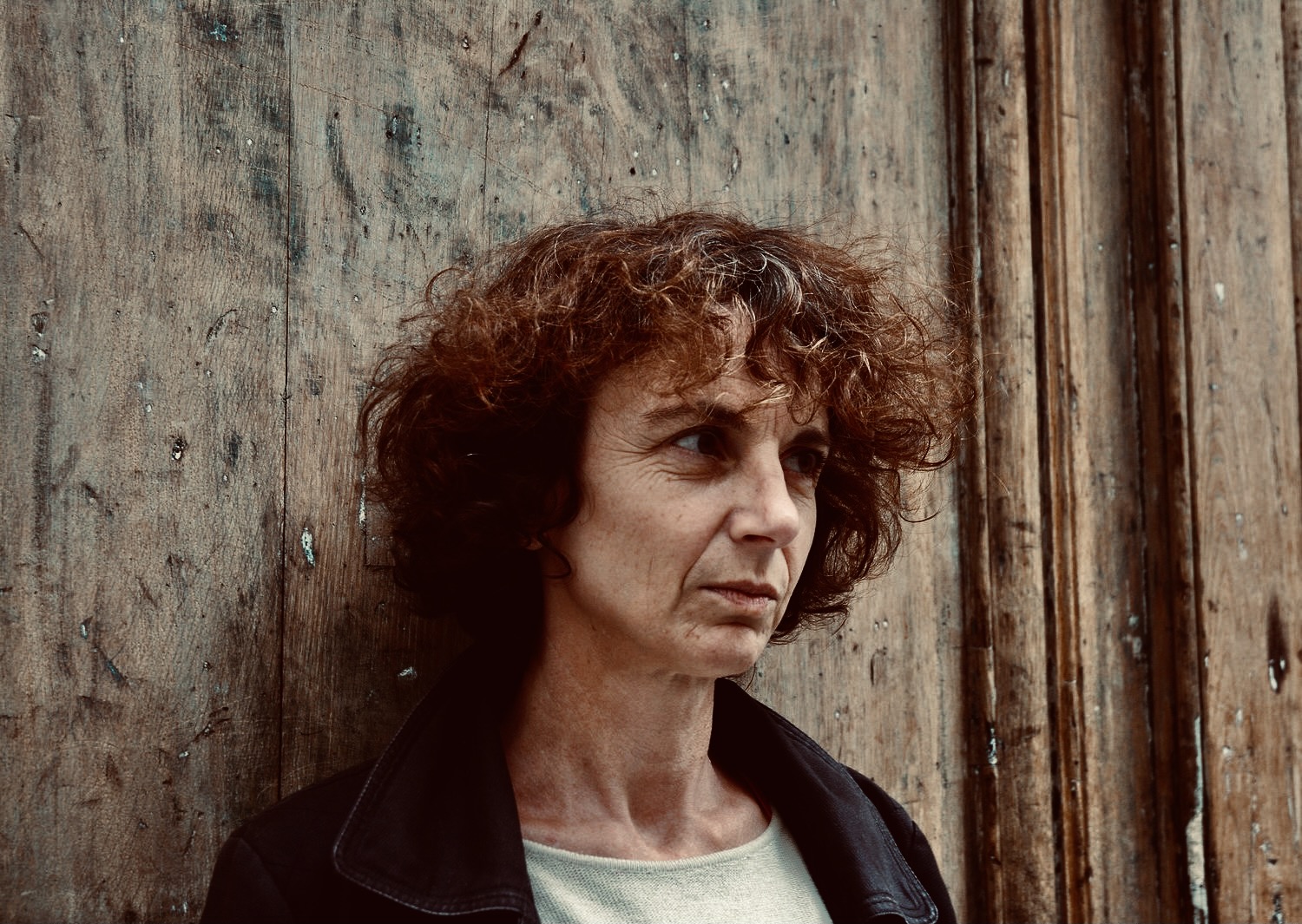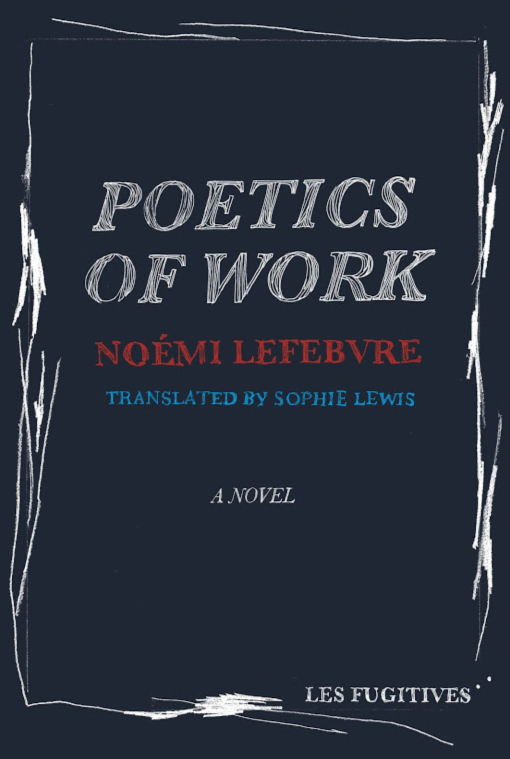An Interview
with Myself
Noémi
LEFEBVRE
Translated by
Adrian BRIDGET
Adrian BRIDGET
On publication of the sharply satirical POETICS OF WORK—a novel set against the backdrop of rising nationalism that marked the state of emergency following the 2015 terrorist attacks in Paris (and her second to be translated into English)—Noémi LEFEBVRE agreed to take part in an exclusive interview... with herself.


N.L. —
Could you tell me, Noémi, why did you write POETICS OF WORK?
Could you tell me, Noémi, why did you write POETICS OF WORK?
NOÉMI —
I don’t know… I’m not able to answer your question. Anything I could say would be a way of justifying the book… There is nothing that justifies it, or anything could. Why ask why? It reminds me of the question the Surrealists would ask writers just after the First World War, ‘why do you write?’
I don’t know… I’m not able to answer your question. Anything I could say would be a way of justifying the book… There is nothing that justifies it, or anything could. Why ask why? It reminds me of the question the Surrealists would ask writers just after the First World War, ‘why do you write?’
Oh yes, Blaise Cendrars replied ‘just because’…
Yes. Just because, that’s the way it is, that’s all there is to it… Because.
Much later, when two reporters from Libération asked the same question, Beckett replied ‘bon qu’à ça,’ good for nothing else. It was more accurate…
Bon qu’à ça, yes. Beckett’s answer is a self-diagnosis. Being unable to live like everyone else, to fit in the categories that civilised humanity expects. Maybe you know Doris Lessing’s answer, which is close to Beckett’s since it is, too, an acknowledgement of this ineptitude in the face of humanity, a rejection of writing as a mark of civilisation, ‘I write because I’ve always written, can’t stop. I am a writing animal.’
Nice reply. It makes me think of the literary programme Écrire pour tous [see here], which you wrote for the news website Mediapart. It was a kind of rescript of the notorious 1960s broadcast Lectures pour tous [see here], in which an animal spoke of writing…
[Personally, as a dog, I do not need to look for something to say in an inadequate language ... it is the inadequacy of language that makes this question of writing today so important, and maybe even disturbing for the political animal.]
Yes, it was in response to the theme proposed by Mediapart, ‘writing today’… This expression, ‘writing today,’ can be understood as a distant echo of the necessary involvement of the writer in their time, as it was stated by Sartre in the journal Les Temps Modernes ...
[see here]
[see here]
Necessary? What does that mean?
‘Necessary’ is both that which is actually demanded and that which should be demanded of the writer. It could be either a fact or a duty. Sartre didn’t break away from this ambiguity. He presented the writer’s responsibility in relation to the issues of their time as a given, while turning it into a project for the post-war period. The word ‘responsibility’ in those years, for Sartre, inferred a moral of engagement, a moralism even, a way to fight against the ‘guilty conscience’ of the occupation years. The seriousness of Sartre, his anti-bourgeois posture… it’s all quite astonishing. There you have someone on whom doubt casts no shadow! Anyway. It seems to me that this idea of the writer as ‘engaged intellectual,’ which started with Zola at the time of the Dreyfus affair and was transformed by Sartre into literary theory, we could even go as far as to say practical theory, has gradually turned—surely under the influence of television and mass media—towards an idea of the writer as fairly bourgeois, an idea according to which there would be beings who would constitute an exception, better equipped than others, and who, since they would be writers, and would be identified and recognised as such, would be both writing experts and experts of their time. My idea is that writers, if we consider them to be part of a particular category in the human species, are experts in nothing at all. They don’t know any better than anyone else what ‘writing’ means, or what ‘today’ means, and definitely not what ‘writing today’ means. Rather than answering it, what I wanted was to play around with a discussion on the topic, with the help of a television studio set pieced together by my imagination, so as to involve characters that were meant to be experts.
And there was a dog…
Yes, there was, a dog in the company of Sartre, Jankélévitch, Maurice Chevalier, Françoise Sagan, Peter Falk, and a few others. This dog made it clear that the human being, whom we call a language being, was, among the animals, really the only one to have language problems. Psychoanalysis reiterates this.
Do you mean to say that Doris Lessing is a dog?
Doris Lessing isn’t a dog, she is like a dog. The writing animal, as I understand it, is one that hasn’t made its writing into a symbol of belonging to civilisation. It exists in a different realm, one without institutions, not civilised, incorrect. What does the writing animal do? It writes, it doesn’t say why, it doesn’t have to rationalise it. To come back to your first question, since I’m not Cendrars nor Beckett nor Lessing and certainly not Sagan or Sartre, I will answer you: ‘Who cares?’
All right, you don’t want to talk about yourself, but could you speak about the book? Say what it is about? And its title, POETICS OF WORK, is it a way to present the question of employment? Of poetry? Of employment and poetry?
It seems to me there are three elements in this, not two. Work, poetry, and violence. To conceive a poetics of work is to apply the rules of an art of language to the rhetoric of employment agencies. The clash is unavoidable. With the poet Laurent Grappe, we made this video ...
... where a poet has an interview with an advisor at a job centre. Two worlds collide, there is an absolute lack of understanding. The rhetoric of employability comes across in all its mediocrity, but it quietly asserts its domination. The third element is then precisely the violence that belongs to language. The violence of social relationships is first and foremost lexical, and poetry doesn’t often win the battle.
[Do you have a driving licence? / Poetry is the art of setting in motion the depths of the soul. / Yes, but you won’t find a job solely through the motion in the depths of your soul. You need to be able to travel sometimes, see?]
... where a poet has an interview with an advisor at a job centre. Two worlds collide, there is an absolute lack of understanding. The rhetoric of employability comes across in all its mediocrity, but it quietly asserts its domination. The third element is then precisely the violence that belongs to language. The violence of social relationships is first and foremost lexical, and poetry doesn’t often win the battle.
Isn’t that a somewhat stereotypical way of defining poetry?
Of course. But what interests me isn’t looking for the truth or the essence of poetry. Rather, it is to encompass the multiple representations that we have of it. Stereotypes are often old new ideas that have progressively crystallised into ordinary expressions. At the beginning of the Industrial Age, poetry and work were placed on opposite sides of the spectrum. The poets of the early Romantic period stood up against the onslaught of commerce and big industry; poetry refused to conform to the principles of utility and profit that were starting to prevail everywhere. What did Moritz, Goethe’s friend, rebel against? The accounting books of hat manufacturers. And Schiller? Against civilisation, which limits the individual to the actualisation of only a part of themselves. While mechanical mills were being built across Europe, poetry was simply the desire for humans not to be reduced to fragments.
Then is there only a single possibility left to the poet, that of doing nothing?
The development of capitalism has defined two miserable figures as opposites, the worker—a being without qualities, assigned to their station, timed, assessed for each of their actions—and the poet—a solitary dreamer, an outlier in the industrialised world, a flâneur, exiled from the countryside, free, and without ties. These are only figures, of course, but they successfully translate a reality: poetry doesn’t have any place within the logic of productive efficacy. Yet something strange happens. This industrial model, as it branches out into all realms of activity through the invasion of management and selling methods, finds it unbearable that poetry can exist outside the structure of a specific sector, of a model of production, with its products, market, prices… at the same time poetry itself, through its constant self-absorption, has to always fight against the temptation of establishing its laws, its internal regulations, appropriate methods, you see… poetry in ten lessons…
In POETICS OF WORK, there are lessons for the poet…
Yes. I suppose the character finds the idea of learning poetry to be entertaining. These pieces of advice have absolutely no importance, they don’t have the same grandeur as the ones offered by the last heirs of Romantic aesthetics, which were linked to the feudal conception of art as being transmitted from master to apprentice.
In POETICS OF WORK, there are lessons for the poet…
Yes. I suppose the character finds the idea of learning poetry to be entertaining. These pieces of advice have absolutely no importance, they don’t have the same grandeur as the ones offered by the last heirs of Romantic aesthetics, which were linked to the feudal conception of art as being transmitted from master to apprentice.
Is that a critical remark addressed to Rilke and his Letters to a Young Poet?
I don’t know, has this character even read Rilke? They seem more like someone who would always read the same authors—Klemperer, Krauss, Kafka…
Why though? Is it due to a preference for authors whose names start with ‘K’?
Ha! No, actually I don’t know, after all… I think that this character is above all concerned with freedom, in a time when the police state and fascists employ the same vocabulary to spread fear and hatred in the name of the nation and of market laws.
Violence, of course, is not only the clash between two opposite words…
Violence is also the immediate surrounding in which every word we utter has to be fought for, like every sentence we continue to say, so as not to give up on our freedom. That is what we want after all, to be free, isn’t it?
It is.
Ah, you see…
Noémi LEFEBVRE was born in 1964 and lives in Lyon. Further to a PhD in music education and national identity in Germany and France, she has worked as a researcher in political science and taught research methodology for music students at university. She is the author of four critically acclaimed novels in France, and her UK debut, Blue Self-Portrait (2017) has received intense critical acclaim on both sides of the Atlantic. LEFEBVRE is a regular contributor to Mediapart and the bilingual French-German literary review La mer gelée.
LEFEBVRE’s work also appears in Hotel #5;
see here
Adrian BRIDGET is a writer and translator. His published works include the short prose collection Texts That Shouldn’t Be Read Out Loud, and the novel, Treatment. He lives and works in Bristol, UK.
BRIDGET’s work also appears in Hotel #7;
see here
This first English translation of Un entretien avec myself
© Noémi LEFEBVRE 2021, published courtesy of Les Fugitives editions
Author portrait,
© Catherine HÉLIE

